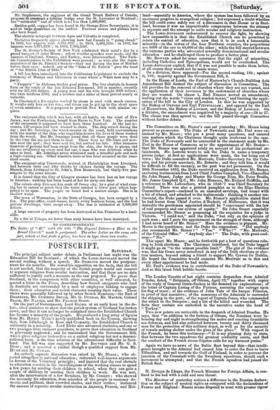POSTSCRIPT.
SATURDAY.
The principal subject under debate in Parliament last night was the Education Bill for Scotland ; of which the LORD-ADVOCATE moved the second reading, without a speech. Mr. Sniu.nia moved the postpone- ment for six months. He rested his opposition on the facts, that the bill is not needed, that the majority of the Scotch people would not consent to separate religious from secular instruction, and that there are no data sufficient to justify such a measure as the one proposed. To prove that Scotland, in the comparison with other countries, is well educated, he quoted a letter in the Times, describing how Scotch emigrants who land in Australia are surrounded by a mob of employers bidding to engage them ; their education and moral character creating their value. These views were generally followed up by other Scotch Members,—the Earl of BALK-MTH, Mr. OUMNING Bauer, Mr. G. DuNDAS, Mr. MACKIE, Colonel Basra, Mr. NAPIER, and Mr. FRANCIS Scow.
On the part of Government, Lord Eteno, at an early hour in the de- bate, cited statistics to show that the parish system of Scotland has broken down, and that it can no longer be sustained since the Established Church has become a minority of the people. He produced a long array of figures from Mr. Horace Mann's newly-published book on the Census, showing that, from Edinburgh to Ross and Cromarty, the Established Church is uniformly in a minority. Lord Elcho also advanced statistics, and one or two passages from eminent preachers, to prove that education in Scotland is grievously neglected ; and he maintained that the Government Bill, which gives religious instruction on a united religious but not a denomi- national basis, is the true solution of the educational difficulty in Scot- land. The bill was also supported by Mr. BOUVERIE and Mr. G. S. DLL; and it received a cordial though a qualified support from Mr. HI;ACE and Mr. Cowan.
An entirely separate discussion was raised by Mr. Mum; who ob- jected altogether to national education; reiterated well-known arguments in favour of the Voluntary principle; and insisted that the real obstacle to education consists in the unwillingness of the working classes to spend a few pence for sending their children to school, when they can gain a couple of shillings by sending their children to work. He was met, after the intervention of a few Members, by Mr. COBDEN ; who showed the necessity for education, from mistakes of the people in economy do- mestic and political, their crowded abodes, and their strikes ; instanced the success of separate secular instruction in America, Prussia, and Hol-
land—especially in America, where the system has been followed by an enormous progress in evangelical religion ; but expressed a doubt whether the bill could come safely out of a discussion in that House or in Scot- land, because it was an impracticable compromise between the attempt to separate and the attempt to unite secular and religious instruction.
The Loan-ADVOCATE endeavoured to recover the fight, by showing how impossible it is that the Established Church can be permitted to retain the control of education, now that it is in such a lamentable minority—in the towns of the four Northern counties, the proportions are 6000 of the one to 40,000 of the other ; while the bill steered between the extreme parties who advocated severally denominational and secular education : and he challenged them to produce a better plan.
Mr. Bowrzn asked for some assurance that the right of minorities, including Catholics and Episcopalians, would not be overlooked. The. Loan-AnvocATE replied, that if it was not possible to make them better, at all events they would not be made worse. On a division, there appeared—For the second reading, 184; against it, 193; majority against the Government Bill, 9.
In the House of Lords, the Earl of Harrowby's Church-Building Acts Amendment Bill formed the subject of discussion in Committee. The bill provides for the removal of churches where they are not wanted, and the application of their revenues to the endowment of churches where they are wanted. On clause 1, Earl NELSON moved an amendment, leaving out the words "cities and market-towns," and limiting the appli- cation of the bill to the City of London. In this he was supported by the Bishop of OXFORD and Earl Frrzwrimum ; and opposed by the Earl of HARROW/1T, the Bishop of LONDON, and the Bishop of Lnicour. On a division, the amendment was negatived by a majority of one-28 to 27. The clause was then agreed to, and the bill passed through Committee without further debate.


































 Previous page
Previous page